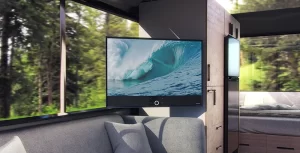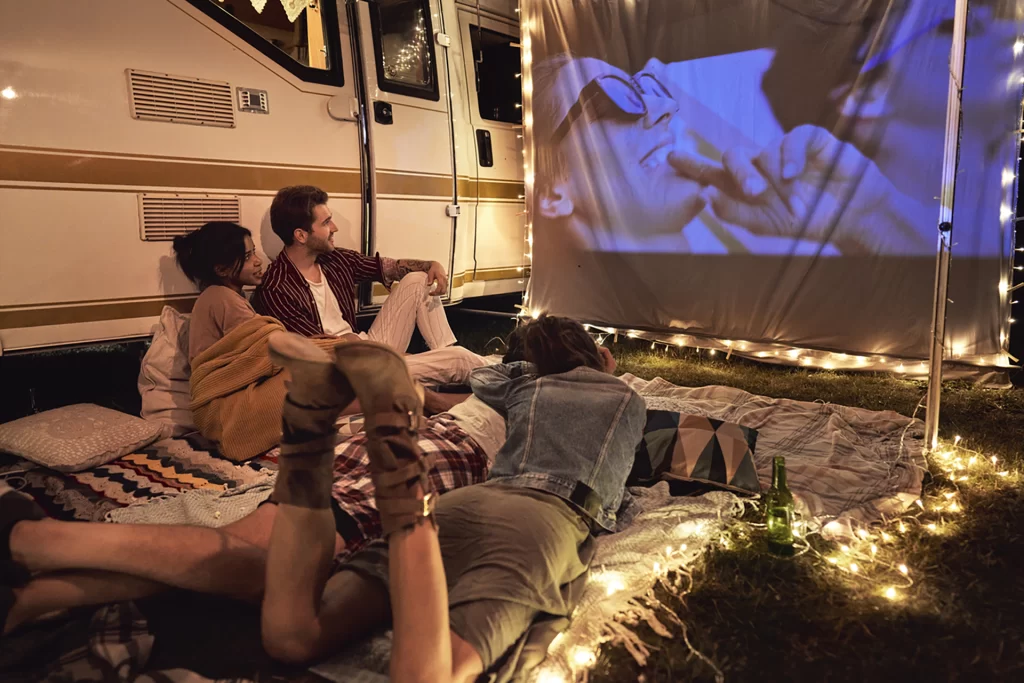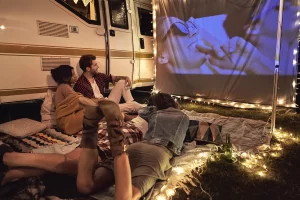When it comes to traveling in an RV, there’s no denying the sense of freedom and adventure it brings. Whether you’re exploring the vast landscapes of national parks or embarking on a cross-country road, having a TV in your RV can take your travel experience to new heights. However, many road-trippers also appreciate the opportunity to disconnect from technology and immerse themselves in their new surroundings. While having a television in your RV can provide entertainment and convenience, it’s also important to consider the potential downsides.
In this post, we will delve into the benefits and drawbacks that come with incorporating a television into your home on wheels.
THE PROs:
Endless Entertainment On-The-Go
Long drives or rainy days at the campsite can sometimes leave travelers longing for some entertainment options. Having a TV in your RV allows you to bring your favorite movies, TV shows, and documentaries along for the journey. Kick back and relax after a day of exploration by enjoying some quality screen time from the comfort of your motorhome.
Keep Yourself Connected

While disconnecting from technology is part of the allure of camping, having access to news updates or checking weather forecasts can be essential for planning activities during your travels. Many modern RV TVs come equipped with digital tuners, allowing you to tune into local news channels and stay informed about any important updates in real time.
Educational Opportunities
Television isn’t just limited to entertainment; it also presents educational possibilities even when you’re away from traditional learning environments. The vast array of educational channels available gives children and adults the opportunities to learn about wildlife, history, science––all without leaving their cozy home-on-wheels. And if you’re out in the wilderness, watching a documentary about the wilderness creates an immersive experience like no other.
Outdoor Movie Nights
One major benefit that having a TV in an RV offers is bringing movie nights outdoors! With many campgrounds now offering outdoor theater spaces or designated areas for setting up projectors, the results can often be magical––imagine watching your favorite flicks al fresco?
What could be better for a still and starry night?
Also, as mentioned, many modern RV TV models come equipped with HDMI ports and USB slots, meaning that watchers are not limited to local channels and DVDs. Streaming content directly from online services like Netflix, Hulu, and Disney+ becomes entirely doable (provided you’ve got a solid internet connection).
Stay Entertained During Downtime
There may be instances where weather conditions can hinder outdoor activities. And naturally, TV is the go-to alternative. Watching sports events, enjoying gaming sessions with the family, and even honing your cooking skills via culinary shows are great ways to beat the boredom during bad weather.
THE CONS:
Distraction from Nature
One of the biggest reasons people choose RV travel is to escape the hustle and bustle of daily life––including the constant need for being connected and entertained 24/7. Having a TV onboard can easily distract you from enjoying outdoor activities like hiking, fishing, or just relaxing by a campfire. It’s important to strike a balance between screen time and embracing the natural environment around you.
Increased Power Consumption
RVs are often equipped with limited power sources, such as batteries or generators. And while there are plenty of tools you can (and should) bring with you on a long-haul road trip, running a television requires an increased level of power consumption which may drain your energy supplies faster than anticipated. This limitation can be particularly challenging if you’re boondocking or camping off-grid for extended periods without access to electrical hook-ups.
Limited Channel Availability
While campground cable connections exist at certain locations, you must remember that reception quality will probably vary significantly depending on where your park is stationed. Many rural areas experience poor signal strength, resulting in fuzzy channels that create frustrating viewing experiences. Be prepared to encounter difficulties when searching for your favorite shows and up-to-date news broadcasts during your travels.
Impact on Group Interaction
RV trips offer great opportunities for bonding with family and friends, and spending quality time together while exploring new landscapes. Having a television present might hinder social interaction among group members when the entire focus shifts towards screens. While occasional movie nights help relaxation, it’s important to not let television dominate the entire trip.
Security Concerns
Having a valuable piece of technology in your RV that is also visible to the public creates an increased security risks, plus the potential for theft and/or damage. Television devices tend to attract unwanted attention and opportunistic thieves might try to help themselves when possible.
So, TVs in an RV: Yay or nay? The choice doesn’t have to be either/or. While having a television setup in your camper offers great entertainment possibilities, it’s important to understand its impact on the overall travel experience. Balancing screen time with nature appreciation is crucial to enjoying the full benefits of your recreational vehicle, and the lifestyle that comes with it. Remember the importance of spending quality outdoor time with family and friends––but also, embrace the convenience of being connected to the world and weather, and having access to movie-watching opportunities under a blanket of stars.
If you’re interested in adding a TV setup to your road trip, the installation specialists at Leisure Coachworks can help. For more information on custom RV installation or upgrade services, contact us.

